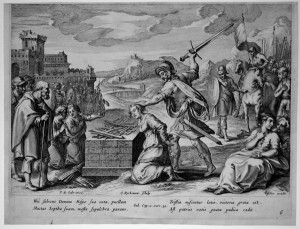A father who wishes his own daughter dead for spending running off and spending his money? Doesn’t sound like the type of guy who’s winning any father of the year awards.
Reading The Merchant of Venice with a contemporary lens, the character of Shylock is definitely the most controversial character in the play. He is irrefutably a negative Jewish stereotype, whose unsavory actions and philosophies run against the grain of the “good” Christian protagonists. However, as Michelle Ephraim points out in her essay “Jephthah’s Kin: The Sacrificing Father in The Merchant of Venice” he is not bereft of moral principal: his devotion to his people and religion helps explain, but not justify, his actions.
Ephraim examines the similarities between Shylock and the Biblical figure of Jephthah, a Jewish “hero of faith.” Judges 11:29-40 tells the story of how Jephthah swore an oath that he would kill the first thing that come out of the door of his house should he be victorious in battle against the Ammonites. When he returns home, he sacrifices his daughter who comes out to greet him.
While it may seem a bit of stretch to draw this comparison, I certainly agree that Ephraim is correct in recognizing a similarity between Shylock’s wish for his daughter as well as the “barbaric” terms of his bond with Old Testament modes of conduct.
OK, so we have a barbaric Jew demanding the death of a good Christian Merchant, at risk because he selflessly aided his friend to find love. Antonio even voices that Shylock is the devil, misinterpreting scripture for his evil purposes. Doesn’t seem hard to pick the villain here.
However, Shylock seems legitimately devoted to a system of justice that is tied to his religious convictions. This leads us away from interpreting Shylock’s actions as that of an evil manipulator, and towards the notion that his principals, which the Christian judge refers to as “strange,” are born out of a misinterpretation (in the eyes of the Christians) of scripture. By constructing Shylock as a Old Testament “hero” of faith and pitting him against Christian judges, Shakespeare creates a discourse about the respective religions sense of justice (more on the nature of this discourse later).
As Ephraim conveys, this reading is further supported by the controversial and differing interpretations of the Jephthah story. During the Reformation, protestant readers sought to reconcile the “barbaric” nature of Jephthah’s sacrifice. To do so, they resisted the idea that he actually murdered his daughter, but instead swore away her ability to marry, thereby removing the Old Testament notions of blood sacrifice. Therefore, we should consider what Shakespeare is doing by invoking these ideas about contesting scriptural interpretation.
While Shylock’s old testament stance is certainly conveyed to be the more “barbaric,” it would be an injustice to his character not to recognize the truth in some of his speeches, such as when he challenges the Christian’s moral superiority by pointing out that they own slaves. By acknowledging that Shylock sense of justice is not all “bad,” and the Christians’ not all “good,” as evidenced by Portia’s complete destruction of Shylock beyond what was necessary to save Antonia, one must consider a reading of the play that is calling into question the validity of any single scriptural interpretation: a bold move by Shakespeare, subtly questioning the church, and subsequently therefore British state.
References:
Nicolas Ryckemans (Dutch, b. c. 1600). Jephta sacrificing his daughter (Holl. 75-86). Engraving after Pieter de Jode I, c. 1625-30.
Michelle Ephraim, Jephthah’s Kin: The Sacrificing Father in The Merchant of Venice. Journal for Early Modern Cultural Studies 5.2 (2005) 71-93. Project Muse. https://muse.jhu.edu/journals/journal_for_early_modern_cultural_studies/v005/5.2ephraim.html

